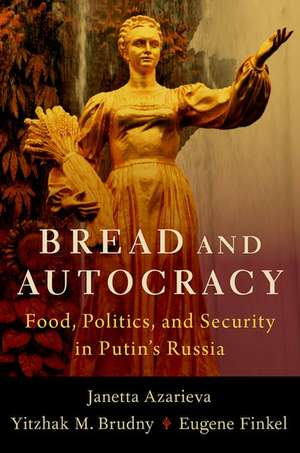Bread and Autocracy: Food, Politics, and Security in Putin's Russia
Autor Janetta Azarieva, Yitzhak M. Brudny, Eugene Finkelen Limba Engleză Paperback – 18 oct 2023
Preț: 134.84 lei
Preț vechi: 154.69 lei
-13% Nou
Puncte Express: 202
Preț estimativ în valută:
25.81€ • 26.84$ • 21.30£
25.81€ • 26.84$ • 21.30£
Carte disponibilă
Livrare economică 13-19 martie
Livrare express 08-14 martie pentru 44.48 lei
Preluare comenzi: 021 569.72.76
Specificații
ISBN-13: 9780197684375
ISBN-10: 0197684378
Pagini: 256
Dimensiuni: 236 x 157 x 15 mm
Greutate: 0.38 kg
Editura: Oxford University Press
Colecția OUP USA
Locul publicării:New York, United States
ISBN-10: 0197684378
Pagini: 256
Dimensiuni: 236 x 157 x 15 mm
Greutate: 0.38 kg
Editura: Oxford University Press
Colecția OUP USA
Locul publicării:New York, United States
Recenzii
The classic works of comparative politics-Gerschenkron, Moore, and Skocpol, for example-were written by scholars with a keen appreciation for the politics of food supply and the relationship between the city and the countryside. Now a new team has devised a clever and compelling analysis of the same factor for our own era. Azarieva, Brudny, and Finkel offer us a timely and fresh study of food security and regime stability in Europe's most dangerous country: Russia. It is a story packed full of unexpected plot twists and lessons for policymakers and academics.
The revival of Russian agriculture behind protectionist barriers is one of the few successes of Russia's economy in recent years, and it helps explain the resilience of the Putin regime in the face of Western sanctions. This is a definitive account of the economic strategy behind Fortress Russia.
The revival of Russian agriculture behind protectionist barriers is one of the few successes of Russia's economy in recent years, and it helps explain the resilience of the Putin regime in the face of Western sanctions. This is a definitive account of the economic strategy behind Fortress Russia.
Notă biografică
Janetta Azarieva is a Research Fellow at the Leonard Davis Institute for International Relations of the Hebrew University of Jerusalem, and a member of the Scientific Committee of the National Nutritional Council of Israel. Her research focuses on government interventions and food security policies.Yitzhak M. Brudny is Professor of Political Science and History at the Hebrew University of Jerusalem. He has been a member of the Editorial Committee of Comparative Politics since 1993. He is the author of Reinventing Russia: Russian Nationalism and the Soviet State, 1953-1991, co-editor of two books on post-communist politics, and the author of numerous articles on Russian politics and nationalism.Eugene Finkel is the Kenneth H. Keller Associate Professor at the Johns Hopkins University School of Advanced International Studies. He works at the intersection of political science and history, with a focus on how institutions and individuals respond to extreme situations: mass violence, state collapse, and rapid change. He is the author of Ordinary Jews: Choice and Survival during the Holocaust and co-author (with Scott Gehlbach) of Reform and Rebellion in Weak States.
